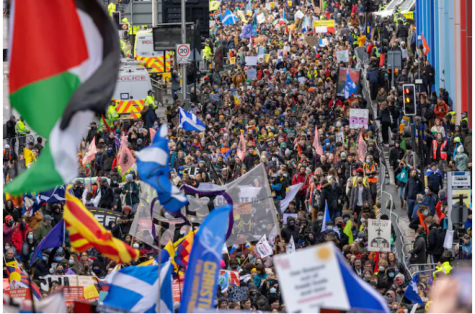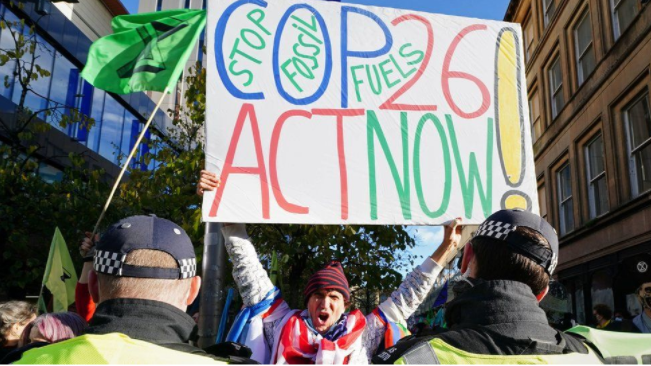Update of Climate Change: COP26 Summit Promises Change
November 12, 2021
The COP26 Climate Summit, held from October 31 to November 12, in Glasgow, Scotland has so far made two big agreements. Ending deforestation and cutting down methane emissions are the two biggest topics during the summit. Many countries have signed on and pledged to help the cause. Between 20,000 to 30,000 delegates are attending the summit.
Famous activist Greta Thunberg attended the conference, stating that the delegates’ slow progress sounded like “blah-blah-blah” to her. Other youth activists, such as Umuhoza Grace Ineza and Ashley Lashley shared their worries about the way such an urgent issue was being handled.
“In my mind, it’s like do these people have children?” Ineza told NPR.

In the streets of Glasgow, protestors seemed to share the same sentiment. More than 100,000 people, frustrated over the lack of progress made from past climate change summits. They were angered that only world leaders and powerful businessmen were allowed to contribute to the conversation on an issue that would affect everyone. “Regular citizens have to hold leaders accountable,” an activist told the Washington Post.
One of the largest accomplishments during the COP26 Summit was the pledge to end deforestation by 2030, especially in Brazil. The world’s largest rainforest, the Amazon, lies in the northern part of Brazil. In the past years many private companies have cut down trees, destroyed ecosystems, killed millions of animals and displaced more. The reasons for the illegal cutting of trees are highways, farming space and the high demand for timber.
“This is a great goal. However, I question whether or not this is a realistic goal. In 2014 there was an agreement to halve deforestation by 2020 (called the New York Declaration on Forests). I have not followed up on the statistics here, but I do not believe this goal was achieved. What plans do countries have in place to ‘end’ deforestation by 2030? I am interested in the specifics on this topic because in my opinion ending deforestation will significantly decrease CO2 emissions and ultimately help climate change” said Ms. Bayliss, a science teacher at Wayne Hills.
Her concerns are mirrored by a mass majority of people, who feel skeptical about the kind of “change” promised, especially with the knowledge of failed past attempts.
During the COP26 Summit, a small group of wealthy nations have come together to decommission coal plants and install renewable energy. The climate deal is worth around $8.5 billion and will be used over the next three to five years. This deal will allow for cleaner energy to be used in various countries around the world. This is a very important plan because lots of rich and powerful countries such as the United States, United Kingdom, Germany and France are a part of this. This deal will minimize the amount of pollution we cause to our planet significantly because of the major countries involved.
So what does this mean for the future?
It means that coal–the single biggest cause of climate change– is soon to be obsolete in 23 countries. Deforestation–currently one of the biggest issues causing climate change– will be reversed by 2030. Methane emissions are going to be reduced by at least 30% by 2030. The Prime Minister of India announced that they intended to generate half of their electricity from renewables by 2030 and achieve net zero emission status by 2070.
These aren’t guarantees for the end of climate change. In fact, it will take far longer than 2030 for the earth to finally start healing. But the COP26 Climate Summit is a step in the right direction. It only proves that youth activists and those outside of power care about the future of the world. Though the pledges may not be the end all be all of these issues, hopefully they will be the motivation for everyone to continue campaigning and caring about climate change.







